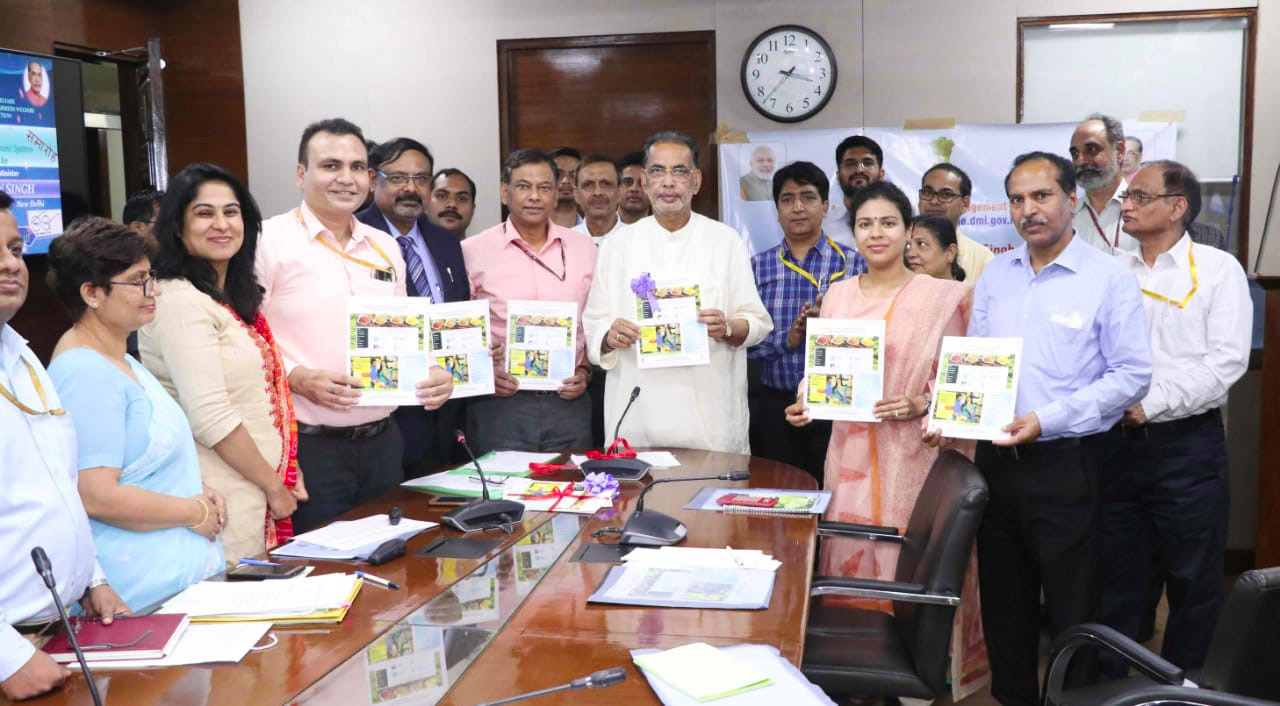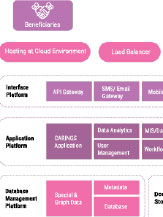AQCMS, developed by NIC, Central Projects, Nagpur, redefines AGMARK certification by replacing manual procedures with a robust digital platform. Built on Certification Management, Laboratory Management, and Content Management System (CMS) modules, AQCMS streamlines compliance and laboratory operations. AQCMS has introduced QR codes, refined roles, and bolstered Laboratory Information Management System (LIMS) capabilities for their laboratories spread across pan India. Thus ensuring quality, trust and transparency in the AGMARK certification processes. With its online application processing, Aadhaar-based e-signed documents, and advanced LIMS features, AQCMS significantly elevates efficiency, trust, and market competitiveness for Indian agricultural products. The computerization of a department operational since 1937 within AQCMS achieves higher efficiency, aligning with the Government of India’s easeof-doing-business policy.
The journey of agricultural produce, from farms to our tables, relies heavily on quality assurances and standards. AGMARK certification, emblematic of quality, ensures adherence to defined grade standards set by the DMI. With 11 Regional offices, 27 Sub offices, 11 Regional Agmark Laboratories, and 1 Central Agmark Laboratory, AGMARK covers 232 agricultural commodities, ensuring quality across fruits, vegetables, cereals, pulses, and more. Agmark Quality Control Management System (AQCMS), a cutting-edge digital platform developed by the NIC, stands as a game-changer in AGMARK certification. Introduced in 2018, AQCMS breaks away from traditional manual procedures, offering a robust digital infrastructure comprising Certification Management, Laboratory Management, and Content Management System (CMS). This platform revolutionises AGMARK certification, aiming to streamline processes, boost efficiency, and introduce transparency into agricultural quality control.
Objectives
AQCMS is designed with several core objectives, aiming to achieve a diverse range of goals pivotal to its purpose and functionality. These objectives include, but aren’t confined to:
Efficiency Boost: AQCMS aims to streamline and speed up AGMARK certification by minimising manual steps and enhancing operational efficiency.
Transparent Process: Ensuring transparency at every certification stage builds trust among stakeholders by providing clarity.
Strengthened Quality: AQCMS maintains stringent standards in agricultural produce, ensuring adherence to predefined quality benchmarks.
All-in-One Portal: Corporate users can apply, pay via Bharat Kosh, check status, and download certificates. Department users handle scrutiny, inspection, and approvals. Department laboratory users process samples, generate test reports, and issue grading certificates. Each stakeholder has a customised dashboard and receives alerts at every stage.
Business-Friendly Approach: Business-Friendly Approach: Several new orders simplify processes (e.g., eliminating site inspections for renewals, removing joint action committees, minimum quantity grading requirements). Online processes and improved transparency save time and effort for both the public and departmental users, fostering a better environment for doing business.
LIMS Integration: LIMS Integration: The online system, LIMS, manages samples drawn by DMI nationwide, ensuring confidentiality and faster processing. Doubly coded samples enhance secrecy and reduce report processing time, connecting all DMI Offices with CAL and RALs to maintain high AGMARK grading standards.
Framework
AQCMS comprises three primary modules, each serving distinct purposes:
- Certification Management (for DMI)
- Laboratory Management (LIMS) (For DMI, RAL, and CAL)
- Content Management System (CMS) (for informational content management)
These modules cover a wide array of scenarios for AGMARK certification and LIMS, eliminating manual intervention. The system’s automation has earned multiple endorsements from NIC for its comprehensive handling of intricate use cases. Key attributes of these modules have been described below:
Certification Module
Integrates crucial elements enhancing the certification process. It features “Online Application Processing” for simplified certificate acquisition, Aadhaar-based e-signed documents, and online payment options for expeditious processing. Real-time SMS and email alerts ensure prompt communication. Online scrutiny and standardised business rules across India foster transparency and accountability, supported by detailed audit trails. Provides public and officials with easy access to MIS reports, online application tracking, and role-based dashboards for efficient decision-making.
LIMS Module
Enhances laboratory operations with features like online sample submission, facilitating data input. Online result processing streamlines AGMARK gradation, ensuring traceability and user-friendliness. Offers data analytics for AGMARK laboratories, aligns central AGMARK standards with international ones, and supports research and standardisation, promoting innovation and quality enhancement. Role-based dashboards enable efficient access to relevant information, aiding effective management and decision-making.
 Fig 8.1: Hon’ble Minister of Agriculture and Farmers’ Welfare
Shri Radha Mohan Singh launched the
online software for Agmark on September 2018 in New Delhi (File Photo)
Fig 8.1: Hon’ble Minister of Agriculture and Farmers’ Welfare
Shri Radha Mohan Singh launched the
online software for Agmark on September 2018 in New Delhi (File Photo)
Technology Used
Following is the technological setup that forms AQCMS’s core, ensuring stability, security, and flexibility to support its intricate operations in agricultural quality control.
Operating System: Ubuntu 18.04 LTS for stability and reliability
Web/DB Server: Apache HTTP Server 2.4.51 for efficient web request handling.
Platform Language: PHP 8.1.10 for robust web development.
Database System: PostgreSQL 13.2 for robust data management.
Application Framework: CakePHP 4.2 for rapid application development.
Design Framework: Bootstrap v5.2.1 for responsive design.
It gives me immense pleasure to express our sincere thanks to National Informatics Centre (NIC), Nagpur on behalf of the Directorate of Marketing and Inspection, Department of Agriculture and Farmers Welfare, Ministry of Agriculture and Farmers Welfare for developing and commissioning of Agmark Quality Control Management System (AQCMS) Phase-I & II for AGMARK Certification activities to online mode. The AQCMS phase I was launched by the then Hon’ble Agriculture Minister on 26.09.2018. Since then the AQCMS software has been made more user friendly, transparent, secure and 24x7. It is being upgraded with new features using modern technology from time to time and has become highly beneficial to Agmark stakeholders, packers, l a b o r a t o r i e s , c o n s u m e r s , public and to officers/ officials of this Directorate.

Faiz Ahmed Kidwai, IAS
Additional Secretary (Marketing)-cum Agricultural Marketing Adviser Government of IndiaFeatures
Following are the key features of AQCMS.
- Export Lab Integration: Simplifies the licensing process significantly.
- Streamlined Replicas Generation: Advanced payment system enables swift issuance of replicas, e-codes, and 15-digit instant codes.
- Complete Registration Cycle Management: From payment to approval, suspension, and beyond, AQCMS manages the entire cycle seamlessly.
- Online Product Misgrading Tool: Empowers DMI for effective monitoring and actions within the system.

Development
AQCMS was planned in phased development using Agile methodology. Phase I was completed in 2018. Subsequently, the NIC, Central Projects, and Nagpur team diligently enhanced the system’s robustness and configurability in Phase II. The development scope in AQCMS encompasses an array of improvements, upgrades, and new modules to enhance the efficiency and effectiveness of the existing system. Here’s an outline of the extensive scope of work:
New Additions in Certification Module
- Refining roles between Regional Offices (RO) and Sub-Offices (SO).
- Transfer of entries from RO dashboard to respective SO dashboards.
- Option to mark applications as “Rejected.”
- Provision for optional site inspections during CA renewal, Laboratory Approval, and Printing Press permissions.
- Data structure enhancements with increased field data limits.
- Enabling file uploads (.PDF or .jpeg) and comments during referral stages
- Redefining “MO/SMO” roles as “Scrutinizer.”
- Adding comment options during approval by AMA.
- Workflow changes for Printing Press permissions regarding ownership and tie-up arrangements
- Incorporating SO jurisdictions in existing forms for applications within SO districts.
- Handling Approval of Laboratory (Export) and its renewal through RO and SO jurisdictions.
- Comprehensive change/modification management across various categories
- Implementing QR code creation and issuance in various application processes.
- Provision for advance payment enabling auto generation of replica serials, 15-digit code, E-code etc. saving a lot of efforts of issuance of replica serial, 15-digit code, E-Code.
- Improved MIS
New Process Flows in Certification Module
- With new features, a new process flow has been also adopted for the certification module. It has been briefly described below:
- Dedicated module for logging and displaying application progress history.
- Modules for Chemists’ training and approval, Printing Permission, and Routine Inspections Management.
- Handling Misgraded reports and integrating LIMS analytical reports with Grading and Misgrading Module
- Modules for Surrender, Suspension/Cancellation of CA, Printing Press, and Laboratory
- Backlog data entry modules for syncing physical data with the system.
- Application history modules for easy document retrieval and status tracking.
- Upgrading AQ CMS systems/platforms to the latest versions.
- Integration of Load Balancer Servers for managing increased user traffic.
New Features in LIMS Module
- Aadhaar-based e-signing, SMS, and email alerts for Sample Test Reports.
- Monthly performance reports, MIS reports, and concise statistics.
- Distinguishing NABL accredited and non-accredited laboratories.
- Flows for ‘Inter Laboratory Comparison’ and ‘Research Sample Analysis.
- Flow for ‘Commercial Sample Analysis’.
- Preparation of statistical and analytical reports for standards.
- QR codes in sample encoding and printing.
- Work allocation modules for officer transfers or retirements, ensuring effective workload management.
Impact
AQCMS holds significant importance in the AGMARK context due to its numerous benefits: 24/7 availability, online payments, userfriendliness, reliability, and cost-effectiveness. It not only facilitates ease of doing business but also improves efficiency, transparency, and consumer trust while strengthening market competitiveness. Stakeholders benefit from appealing dashboards displaying pending actions, statuses, and required steps.

Way Forward
As AQCMS progresses, Phase III aims to propel this platform to new heights. This phase revolves around extensive expansion, leveraging advanced technologies to streamline processes, boost user accessibility, and enhance scalability. It will focus on deeper integrations with evolving agricultural systems, incorporating IoT, AI advancements, Improved MIS, Mobile applications, and creating a more interconnected agricultural quality control network. Embracing this transformative journey, AQCMS is set to surpass expectations, establishing new benchmarks in AGMARK certification and LIMS.

Contributors / Authors

Tarun S ShrivastavaSr. Technical Director & HoD tarun.ss@nic.in

Jayant M. BoradeTechnical Director jm.borade@nic.in

Akash JoshiScientist - B akash.joshi93@nic.in
- Tag:
- Internet
- Technology
- eGov
- Tech
Tarun S Shrivastava
Sr. Technical Director
HoP, Central Projects Nagpur, A-Block, CGO Complex
Seminary Hills, Nagpur, Maharashtra - 440006







